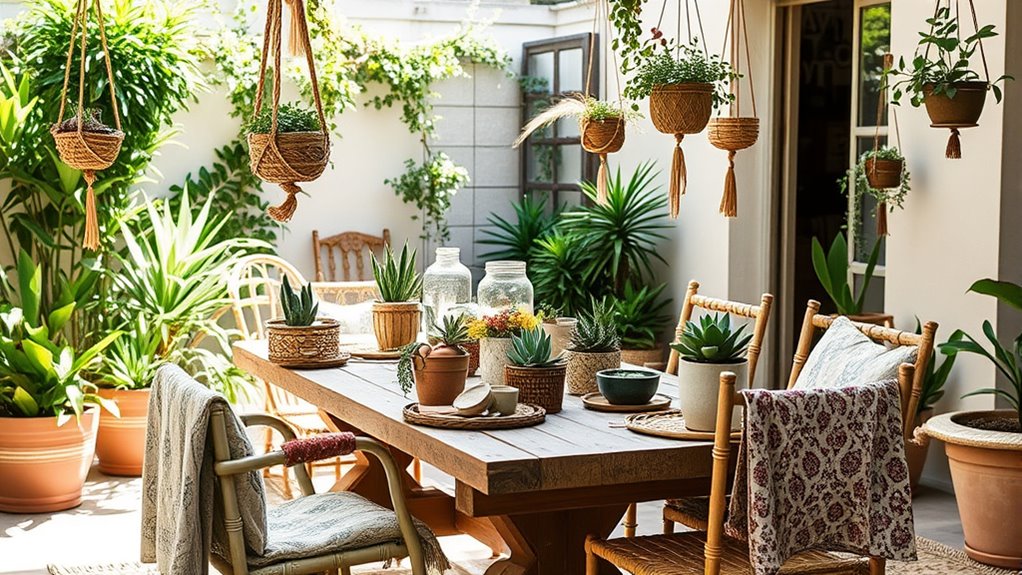To embrace boho sustainability and low-waste living, get creative with upcycling discarded items into decor or accessories, support local artisans, and shop in bulk using reusable containers. Prioritize buying seasonal, organic foods from farmers markets, and choose durable, timeless items that last. Incorporate eco-friendly personal care and connect with community initiatives for shared sustainability goals. Staying mindful of your consumption helps you live freely while caring for the planet—discover how to make it happen.
Key Takeaways
- Embrace DIY upcycling to turn discarded items into boho decor and accessories, reducing waste and fostering creativity.
- Shop in bulk with reusable containers from local sources to minimize packaging waste and support sustainable food systems.
- Choose durable, high-quality items and support ethical brands to promote minimalism and reduce frequent replacements.
- Use reusable personal care products like menstrual cups and eco-friendly toiletries to cut down on single-use plastics.
- Participate in community eco-events and join zero waste groups to strengthen your low-waste lifestyle and connect with like-minded free spirits.
Embrace Creative Reuse and Upcycling
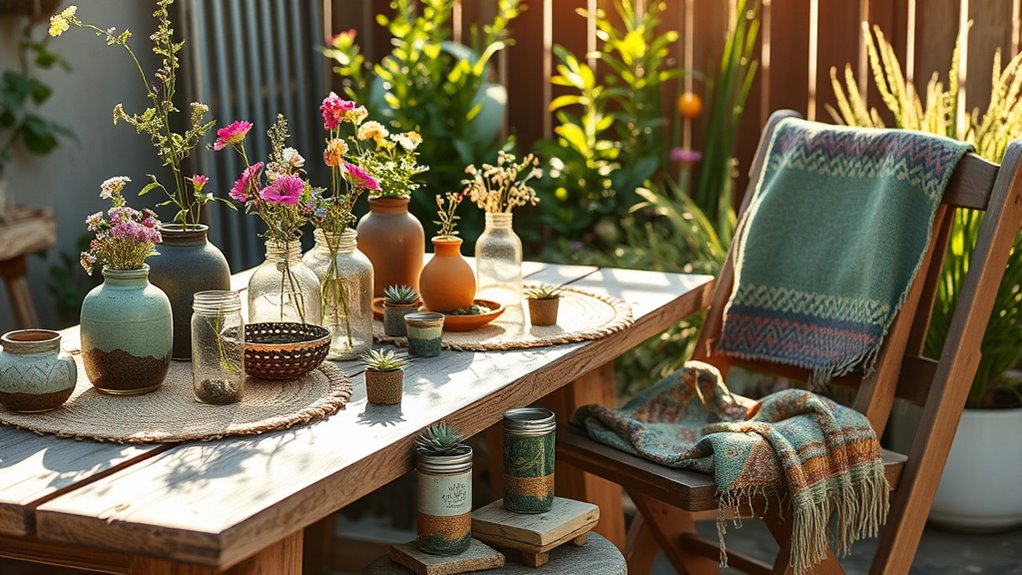
Embracing creative reuse and upcycling allows you to transform everyday discarded items into beautiful, functional pieces that reflect a boho aesthetic. With upcycling, you turn old glass jars, fabric scraps, and jewelry into unique boho decor and accessories. DIY projects like converting pallets into furniture or T-shirts into reusable tote bags not only support sustainable practices but also showcase your personal style. Recycled textiles can become one-of-a-kind clothing or home textiles, minimizing reliance on fast fashion and reducing textile waste. Repurposing materials encourages a circular lifestyle, embracing zero waste principles. Additionally, understanding payment processing rules and tax implications can help optimize your financial sustainability alongside your eco-friendly lifestyle. Practicing creative reuse and upcycling not only reduces waste volume but also fosters a more eco-friendly way to decorate and dress with a boho vibe. For example, some upcycling kits include electric bike conversion kits, which empower you to explore eco-conscious transportation options while maintaining your unique style. Incorporating sustainable materials into your projects further enhances your commitment to environmental responsibility. Exploring DIY candle making can add a warm, personalized touch to your eco-friendly decor, combining craft with sustainability.
Prioritize Bulk Shopping and Reusable Containers
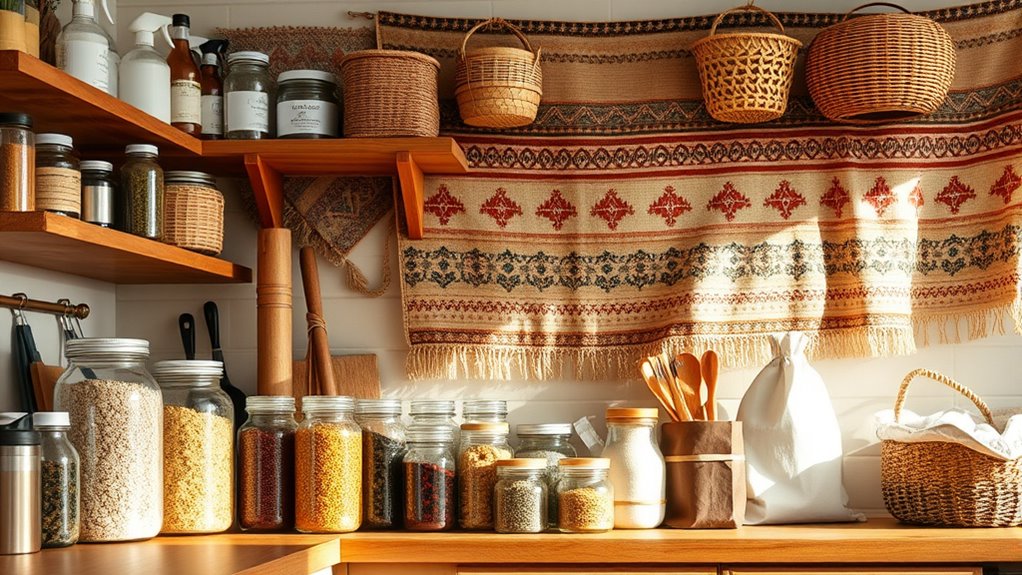
Prioritizing bulk shopping and reusable containers is a simple yet effective way to reduce waste and support sustainable living. By choosing bulk food storage, you cut packaging waste by up to 80%, making a significant environmental impact. Using reusable jars, mason jars, or cloth bags prevents single-use plastic waste and encourages plastic-free shopping. Joining local bulk purchasing groups can help you access eco-friendly products at lower costs while minimizing trips. Reusing existing containers for grains, snacks, or dry goods extends their lifecycle and aligns with zero-waste principles. To enhance your sustainable habits, consider:
- Shopping at stores that offer loose produce and bulk items
- Using reusable containers for all your bulk food storage needs
- Opting for eco-friendly products that support zero waste
- Switching to reusable jars for pantry organization
- Supporting brands committed to plastic-free packaging
- Incorporating reusable materials into your daily routines to further reduce reliance on disposable items. Additionally, exploring self-watering plant pots can help you maintain your plants with less frequent watering, reducing water waste and supporting eco-friendly gardening practices. Implementing fraud prevention tools when purchasing eco-friendly products online can help safeguard your transactions and personal data, ensuring a secure shopping experience. Incorporating reusable packaging options can further minimize your environmental footprint and promote a sustainable lifestyle.
Support Local, Sustainable Food Sources
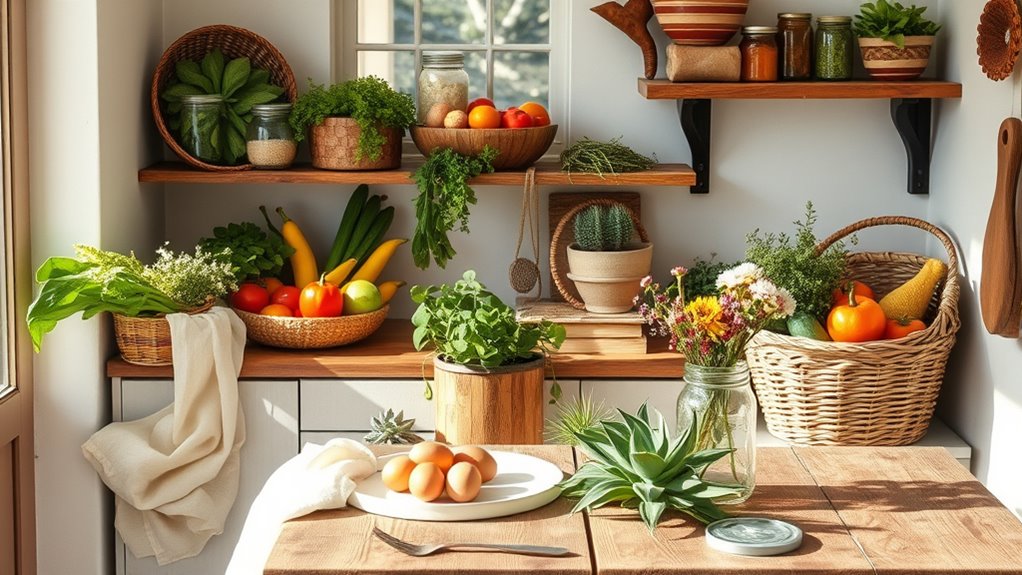
Supporting local farmers markets and CSA programs helps you get fresh, seasonal foods while reducing environmental impact. When you buy directly from nearby sources, you cut down on transportation emissions and support your community’s economy. Choosing these options also promotes biodiversity and food justice in your area. Additionally, sourcing from local suppliers often ensures higher quality and freshness in your food choices supporting local food systems. Engaging with local food networks can further enhance your sustainability efforts by connecting you with a broader community of conscious consumers. Incorporating regenerative agriculture practices into your food sourcing can also help restore soil health and increase crop resilience. Embracing these methods encourages a more resilient food system that benefits both the environment and local farmers.
Farmers Markets Thrive Naturally
Have you ever noticed how farmers markets offer a vibrant, fresh alternative to supermarket shopping? When you buy directly from local farmers, you support sustainable farming practices and help keep farmland intact, preventing urban sprawl. These markets highlight seasonal produce and organic options, encouraging more plant-based meals that reduce food waste. Shopping at farmers markets also minimizes packaging waste, since many vendors sell in bulk or with minimal wrapping. By choosing locally grown foods, you strengthen community resilience and promote environmentally friendly food systems. Supporting farmers markets isn’t just good for your health; it’s a powerful way to reduce your carbon footprint and foster a sustainable lifestyle. These markets thrive naturally because they connect you directly to the source of your food, nurturing both the environment and your community. Incorporating local produce into your diet can further enhance your commitment to sustainability and support eco-friendly agricultural practices.
Community Supported Agriculture (CSA)
Community Supported Agriculture (CSA) programs offer a direct connection between consumers and local farmers, building on the farmers markets’ emphasis on fresh, seasonal produce. By joining a community supported agriculture membership, you support local and sustainable farming practices while enjoying eco-friendly, fresh food. CSA shares typically include weekly or biweekly deliveries of fruits, vegetables, and sometimes dairy or meat, promoting seasonal eating and reducing food waste. Supporting farmers through CSA helps lower your carbon footprint by cutting down on long-distance transportation and industrial farming methods. These programs also foster transparency and ethical practices, strengthening the local food movement. Engaging in CSA not only ensures you get nutrient-rich, seasonal produce but also aligns with your low-waste lifestyle and commitment to supporting sustainable, local food sources. Understanding food systems can deepen your appreciation for the impact of your choices and encourage more mindful consumption. Incorporating a variety of eco-friendly packaging options can further reduce waste associated with your CSA shares. Additionally, choosing reusable and biodegradable containers can significantly minimize single-use plastic waste during food distribution. Being aware of the history of sustainable farming can inspire more meaningful participation in local food initiatives, especially as modern home furnishings and practices increasingly focus on eco-consciousness and durability.
Cultivate a Mindful Approach to Consumption
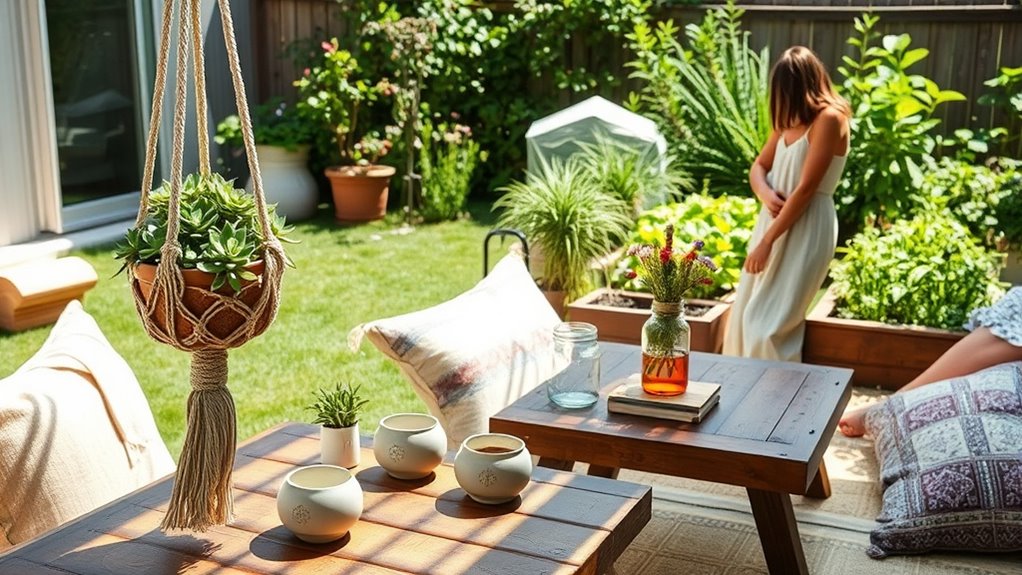
Adopting a mindful approach to consumption means intentionally choosing items that are high-quality and built to last, which reduces the need for frequent replacements and minimizes waste. By prioritizing mindful consumption, you support sustainable living and lessen your environmental impact. Focus on supporting ethical brands and selecting eco-friendly materials, ensuring your purchases align with your values. Reusing, repurposing, and repairing items extend their lifespan, embodying a low-waste lifestyle. Practicing gratitude for what you already have reduces impulse buying and encourages minimalism. This approach fosters a deeper connection to your possessions and the environment. To deepen your mindful consumption, consider:
- Choosing durable, timeless pieces
- Supporting local artisans and ethical brands
- Reusing and repurposing household items
- Prioritizing quality over quantity
- Investing in versatile, eco-friendly materials
- Embracing remote hackathons as a way to connect with global communities and learn new skills without leaving your home
- Developing an understanding of mind-body connection can enhance your awareness of how your consumption choices impact your overall well-being. Incorporating sustainable practices into daily routines can further reinforce your commitment to low-waste living. Understanding fetal development and pregnancy health can also influence mindful choices during different life stages, fostering a holistic approach to sustainability. Staying informed about beauty store hours can help you plan eco-conscious shopping trips more efficiently.
Incorporate Eco-Friendly Personal Items and Practices
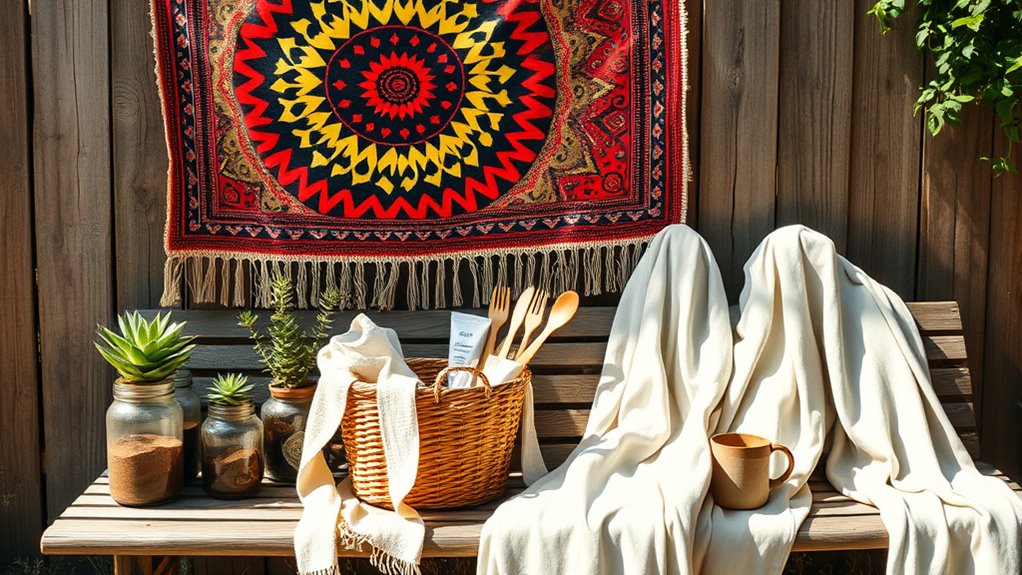
Switching to reusable personal items like menstrual cups or cloth pads helps cut down on plastic waste. Incorporating natural, biodegradable products and simple cleaning ingredients reduces your environmental footprint. By choosing brands with minimal or recycled packaging, you support a more sustainable beauty routine. Exploring eco-friendly products can further enhance your low-waste lifestyle. Additionally, selecting paint sprayers designed for efficiency and minimal overspray can help reduce paint waste during home projects. For outdoor adventures, using electric dirt bikes with high efficiency and minimal emissions can also support your eco-conscious goals.
Reusable Personal Items
Using reusable personal items is one of the simplest ways to reduce your environmental impact daily. By choosing eco-friendly, plastic-free options, you can considerably cut down on waste while saving money over time. Switching to reusable clothing, water bottles, and period products helps prevent millions of single-use items from ending up in landfills. Reusable menstrual products like menstrual cups, cloth pads, and period underwear can reduce waste by up to 90%, making a big difference. Incorporating these items into your routine supports a zero waste lifestyle and encourages mindful consumption.
- Reusable water bottles made of stainless steel or glass
- Cloth or silicone menstrual cups and period underwear
- Plastic-free, eco-friendly personal care items like bar soaps and bamboo toothbrushes
- Reusable cotton pads or cloth wipes
- Durable, zero waste clothing options
Eco-Conscious Daily Practices
Incorporating eco-friendly personal items and practices into your daily routine makes a tangible difference in reducing waste and minimizing your environmental impact. Switch to reusable water bottles and travel mugs made from stainless steel or glass to avoid single-use plastic bottles that pollute oceans. Use cloth pads or period underwear instead of disposable menstrual products, and choose zero waste options like natural soaps, solid shampoos, and toothpaste tablets to cut down on plastic packaging. Replacing disposable cotton swabs and wipes with reusable cotton pads or cloth wipes helps reduce waste and wasteful consumption. Embrace natural cleaning ingredients like vinegar, baking soda, and lemon scraps to maintain a clean space with minimal chemical reliance. These small changes support sustainable living and help you live more consciously every day.
Connect With Community for Shared Sustainability Goals
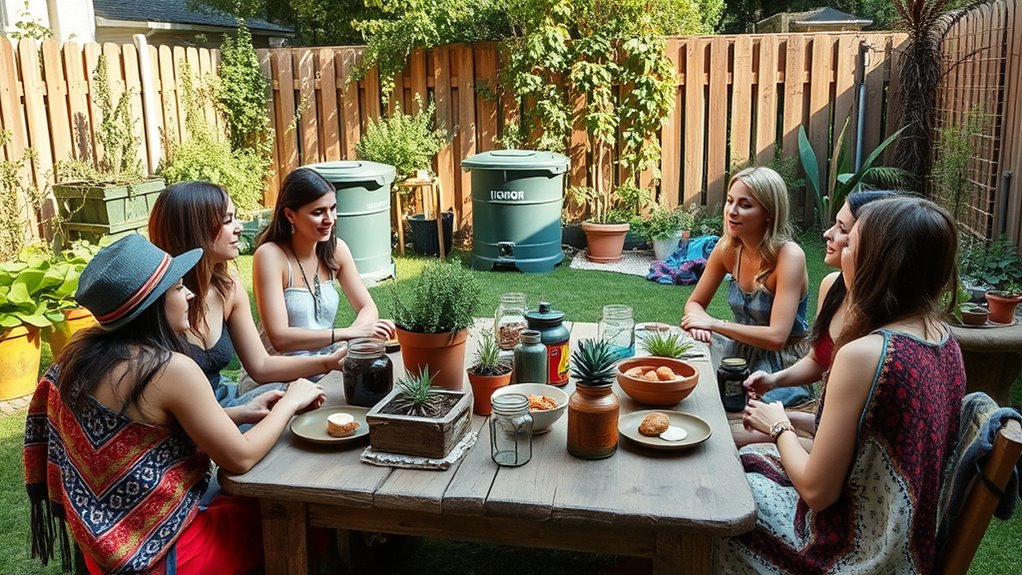
Connecting with a community dedicated to sustainability can substantially boost your efforts and keep you motivated. When you join local or online zero waste groups, you gain access to resources, support, and shared learning that help you stay aligned with your sustainability goals. Participating in group events like clean-ups or workshops strengthens community bonds and fosters eco-conscious habits. Sharing experiences and tips within your community reveals effective strategies and fresh ideas for boho living. Collaborating with others enables collective action, such as bulk purchasing, which reduces packaging waste and makes eco-friendly choices more affordable. Additionally, engaging in advocacy within your community amplifies your impact, inspiring systemic change and inspiring others to join the movement toward a more sustainable future.
Frequently Asked Questions
What Are the 5 R’s of Zero Waste Living?
The 5 R’s of zero waste living are Refuse, Reduce, Reuse, Recycle, and Repair. You can start by refusing unnecessary items, especially single-use plastics, to prevent waste. Then, focus on reducing your consumption, reusing items whenever possible, and recycling materials properly. Finally, repair broken items instead of discarding them. Following these steps helps you minimize waste, conserve resources, and live more sustainably.
What Are the 7 R’s of Zero Waste?
You’re asking about the 7 R’s of zero waste, which guide you to reduce your environmental impact. First, you refuse unnecessary items, then reduce what you buy. Reuse and repair extend product life, while regifting and recycling prevent waste from ending up in landfills. Finally, recover energy from waste when reduction isn’t possible. Following these steps helps you live more sustainably and minimize your waste footprint effectively.
What Are the 3 Steps to Living a Zero Waste Lifestyle?
To start living a zero waste lifestyle, begin with a trash audit to see what you throw away most. Then, make simple swaps like reusable bags and bottles to cut down on single-use plastics. Finally, set achievable goals, such as avoiding plastic for a week or reducing food waste, to build sustainable habits step by step. These actions help you create a more eco-friendly, low-waste routine.
What Is the Zero Waste Lifestyle?
Imagine a river flowing freely, unburdened by trash—this is the essence of the zero waste lifestyle. You aim to minimize waste by refusing excess packaging, reducing consumption, and reusing items. It’s about working with nature’s cycle, not against it, endeavoring for systemic change. While perfect zero waste is nearly impossible, your efforts help create a cleaner, more sustainable world, one mindful choice at a time.
Conclusion
By embracing these low-waste tips, you’ll transform your life into a vibrant, eco-friendly oasis, where every reused jar and handmade item sparks a revolution of sustainability. Picture yourself dancing through markets with reusable bags in hand, your home bursting with upcycled treasures, and your community united in eco-conscious cheer. This isn’t just living sustainably — it’s creating a breathtaking, colorful tapestry of free-spirited, planet-loving joy that’ll leave the world forever changed.
